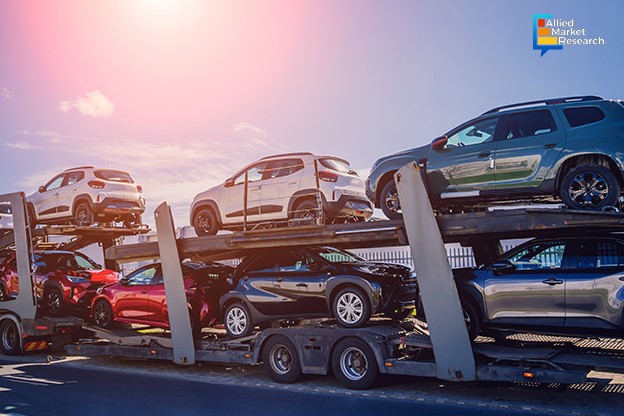How Are Car Carriers Leading the Way toward Green Logistics?

18 Jul
2024
Highights:
- Analyzing prominent car carriers
- Innovations in car carriers
- MOL’s key initiative
- Visionary moves of industry leaders
Car carriers, also known as vehicle transporters or auto transport carriers, play an important role in the automotive logistics industry. They are specially designed trucks or trailers used to transport vehicles from manufacturers to dealerships, or from one location to another for various reasons. With the growing demand for efficient and safe vehicle transportation, car carriers have evolved significantly to meet the needs of the automotive industry and its customers.
Popular car carriers satisfying various industrial needs
Auto transport carriers come in a multitude of shapes and sizes, each tailored for specific transport needs. Open car carriers are a common sight on the roads, offering versatile transportation for a wide range of vehicles. Whether it's a brand-new car, a cherished classic, a project car, or a salvage vehicle, open car carriers easily handle them all. These carriers allow for easy drive-on loading and make use of a winch for non-running cars. Open car carriers are primarily of two types: single-level and multi-level carriers. Single-level carriers are typically used for short distances and carry a few vehicles. They are often used for local dealership deliveries. However, multi-level carriers are the most common type of car carriers that transport up to 10 vehicles at a time, depending on the size and configuration. Multi-level open carriers are cost-effective and widely used in long-distance transportation of new and used vehicles.
On the other hand, enclosed trailers offer a secure and efficient way to transport high-value cars with the utmost care and discretion. They not only shield vehicles from unfavorable weather, but also provide a level of privacy essential for luxury and exotic car owners. These trailers are designed with shorter ground height than open car carriers, allowing for easy loading of low-clearance vehicles such as sleek race cars. Moreover, enclosed trailers are also equipped with winches to safely load non-running cars, ensuring safe transportation of most delicate vehicles without any issues.
Technological advances in car carriers
The car carrier industry is undergoing significant transformations driven by notable technological advancements. These innovations aim to enhance efficiency, safety, and sustainability in vehicle transportation. Telematics systems and the Internet of Things have revolutionized fleet management. Car carriers now come equipped with advanced telematics systems that provide real-time data on vehicle location, speed, and engine performance. This data helps fleet managers monitor carrier operations, optimize routes, and reduce fuel consumption. Moreover, IoT sensors on car carriers also monitor the condition of transported vehicles, ensuring they are secure and undamaged. These sensors provide data on temperature, humidity, and vibration levels, which can be crucial for transporting high-value or sensitive vehicles.
Further, the increasing emphasis on sustainability has led to the development of electric and hybrid car carriers. These carriers reduce greenhouse gas emissions and dependence on fossil fuels. Companies such as Tesla and Nikola are pioneering electric truck technology, which is expected to bring innovations to car carriers. In addition, electric and hybrid carriers offer quieter operation and lower maintenance costs compared to traditional diesel-powered carriers. With the ongoing development of battery technology, the range and payload capacity of electric carriers will continue to increase in the coming years, making them a sustainable alternative for long-distance vehicle transportation.
MOL’s initiative to boost the operational efficiency of car carriers
In April 2024, Mitsui O.S.K. Lines, a Japanese transport company introduced the J-CARPS system, jointly developed with the Japan Cargo Tally Corporation. This system is designed to streamline and enhance the efficiency of the car loading process of car carriers. a process that typically involves loading thousands of units onto a single vessel. Traditionally, information about the location and quantity of cars loaded onto car carriers was managed separately by shipping companies and the J.C.T.C. (Journal of Chemical Theory and Computation) with data shared via email. However, MOL recognized the potential for improved efficiency by centralizing this data into a unified system. As a result, the J-CARPS system was developed, providing a single database where all parties were involved, including shipping companies, stevedore companies, and the J.C.T.C. The system accesses and updates loading plans and performance data in real-time.
One of the key features of J-CARPS is its “file attachment function” and “simple message sending function,” allowing stakeholders to communicate and collaborate seamlessly within the system. Additionally, by consolidating databases and standardizing data formats, J-CARPS eliminates discrepancies between systems and enables shipping companies to optimize loading capacity more accurately.
Groundbreaking collaborations of industry giants showcasing commitment toward sustainability
In April 2024, UECC (United European Car Carriers) announced its collaboration with industry leaders including maritime advisory organization Lloyd’s Register FOBAS, engine manufacturer Wartslia, and biofuel supplier ACT Group, to promote CNSL-based biofuel as marine fuel. As a part of this partnership, ACT Group created a CSNL-based biofuel, known as FSI.100, demonstrating their commitment to innovation and sustainability. This was achieved through a rigorous development process, which included extensive engine testing and a meticulously controlled supply chain, earning the trust of UECC. FSI.100 addresses concerns about the popularity and suitability of CSNL-based biofuels. It also offers compelling advantages including a certified, sustainable, and fully controlled supply chain that ensures traceability and accountability from the point of origin to extraction, conversion, and consumption.
This approach enhances confidence in CSNL-derived marine fuels, reduces waste, and promotes resource efficiency, aligning with circular economy principles in the maritime sector.
In conclusion, car carriers are an indispensable component of the automotive logistics industry, offering efficient, safe, and cost-effective transportation solutions. With significant technological advancements, car carriers are expected to transform the inventory management of automobiles in the future, while ensuring the delivery of vehicles in optimal conditions.
To identify new market segments and new opportunities in the car carrier industry, contact our esteemed analysts today! They will also help you develop new business strategies and initiatives.

Rosy Behera
Author's Bio- Rosy Behera holds a bachelor’s degree in Electrical and Electronics Engineering and now she is a content writer by profession. She loves to portray her thoughts and ideas with a nice command of words. Grabbing an audience with her creative write-ups is one of her biggest assets so far. Apart from writing, she is a certified “Odisi” dancer and has done Gardharva in Drawing, Painting, and Arts. She always explores new things through travel and is a big foodie.
Why Has Automotive Gateway Technology Become Indispensable to Vehicle Manufacturing Companies Globally?
Avenue: Entire Library membership of Allied Market Research Reports at your disposal
- Avenue is an innovative subscription-based online report database.
- Avail an online access to the entire library of syndicated reports on more than 2,000 niche industries and company profiles on more than 12,000 firms across 11 domains.
- A cost-effective model tailored for entrepreneurs, investors, and students & researchers at universities.
- Request customizations, suggest new reports, and avail analyst support as per your requirements.
- Get an access to the library of reports at any time from any device and anywhere.
Related Post
-
How are Submarine Cables Transforming Global Connectivity with Enhanced User Experience?
-
Endoscopy Procedures: Transformations in Techniques and Applications
-
AI-Powered Video Analytics: How the Product Actually Works for enterprises
-
Painting Robots: Transforming Precision Coating and Creative Applications
-
Innovations in Pharmacovigilance Systems Advancing Patient Safety
-
Understanding Edge Security: Keeping Data Safe Near the Source
-
Exploring the Use and Advancements of 3D Laser Scanners in Professional Applications
-
Reinforcing Industrial Controls with Smarter Tools and Training








